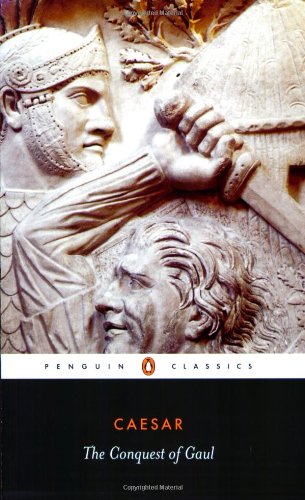Let me offer you one more quotation. Here is Caesar again, describing his victory in a sea battle over the Veneti:
After that it was a soldier's battle, in which the Romans easily proved superior, especially as it was fought under the eyes of Caesar and the whole army, so that any act of special bravery was bound to be noticed... (The Conquest of Gaul, Penguin, 1982: 80)Similar passages stressing the inspiring effect that Caesar's gaze has on his troops abound in The Conquest of Gaul. Just to take one more example, here he describes how he manages to turn around a difficult situation during the battle against the Nervii simply by showing that he's looking at his soldiers: "His coming gave gave them fresh heart and hope; each man wanted to do his best under the eyes of his commander-in-chief, however desperate the peril" (ibid. 69).
We can also note that the ability to "see" can be delegated to commanders lower in rank. In one passage he recounts a speech that Labienus, one of his generals, held to his troops before a battle: "Fight as bravely under me as you often have under the commander-in-chief; imagine that he is here, watching the battle in person" (ibid. 137).
Passages like these show Caesar's awareness of the importance of his gaze. But why is the gaze important? Here it is easy to recall the so-called Hawthorne effect. It's well-known that this effect was discovered in the course of a series of observations conducted at a factory where the researchers experimented with changing one condition after the other (lengthening and shorting working hours, increasing and decreasing the number of breaks, increasing and decreasing pay etc) to see what the effect on worker productivity would be. To their consternation they discovered that productivity increased no matter what changes they introduced. The solution to the riddle, they realized, was that the productivity increase was an effect of being observed. It was the workers' response to the presence of the researchers and the attention the latters paid to them. As the sociologist Johan Asplund points out (in his book Det sociala livets elemäntära former), the workers were simply following their human nature in being socially responsive. It's simply natural to humans to respond to the presence of others and their actions. The inspiring and energizing effect that Caesar's gaze had on his soldiers seems to be of exactly the same kind as the effect that the gaze of the researchers had on the factory workers.
What Caesar directs our attention to is, furthermore, the relation between seeing and ruling. In the many passages where he emphasizes the importance of seeing, he seems, implicitly, to be saying that a central functions of the sovereign (or a place-holder of the sovereign, such as a general) is to be the one who sees. Why is this a central function of the sovereign? This, it seems to me, is related to the fact that the sovereign must also be the one of upholds and guarantees the "public" or "official" side of society. To impersonate the sovereign is to be the one who, by seeing, is capable of endowing an act with official recognition and making it public, thereby rescuing it from oblivion. Again and again, in passage after passage, Caesar rehearses this role. Being seen by Caesar, the act is lifted up from the anonymity of merely private existence and granted a kind of immortality. Why immortality? Since the sovereign, as Kantorowicz points out, has "two bodies" - one that human and mortal and another that is divine and immortal. Here we shouldn't let the language of the "sovereign" in singular mislead us. Even in democratic states lacking individual rulers, the "place" of the sovereign exists, as Lefort points out. Wherever we find anyone trying to monopolize the function of being the one who sees, we are witnessing someone aspiring to fill this empty place.
